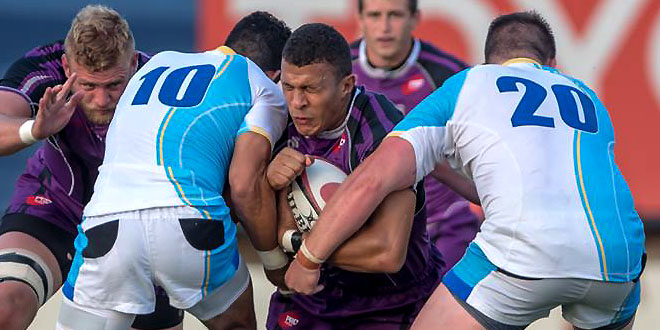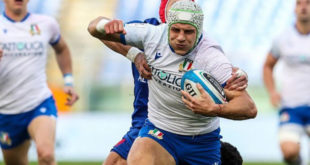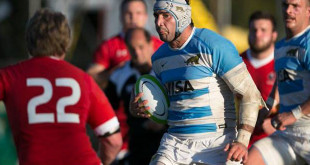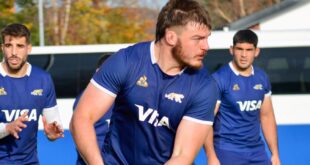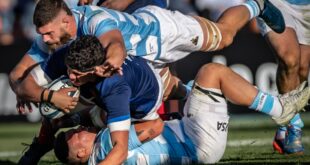PRO Rugby year one is in the books. The Denver Stampede are inaugural champions, lifting the unnamed trophy, and the verdict from American fans is unanimous – they want more. More teams, more players, more games, more exposure. It’s onwards and upwards from here. Before we look at where things might be going, however, let’s look back at the season that was. Specifically, let’s look at some numbers.
TEAM SCORING
If we saw one thing in season one, it was scoring. Lots and lots of scoring. In 60 games played there were 1817 points on the board, an average of just over 60 per game. A total of 243 tries were scored, coming in at about 8 per game. Ohio topped the charts on offense, scoring 69 in their 12 run-outs. Sacramento were least effective going forward at half that.
The high scoring output can likely be attributed to a few things. Near-perfect weather, aside from a little extra sun and that game in the snow, made for ideal conditions for running rugby. Of course it also requires teams, players, and match officials to buy into the desire for positive attacking play.
Playing with unfamiliar teammates and new defensive systems must also be taken into account, though the points kept coming as the season went on, with that familiarity also improving offensive potential. Fitness levels were certainly below optimal, opening more space in the final quarter of games. While that increased as the season wore on, it will be a couple seasons before the players start to catch up with the physical demands of professional rugby.
It’s interesting to note that overall champions Denver did not have the highest offensive output, that instead went decisively to Ohio. They did have the best defense, conceding the least points and least tries. Where bottom-dwellers San Francisco and Sacramento each conceded similar numbers of tries, San Francisco’s ability to score tries pushed them higher up the ladder.
| TEAM | PF | PA | PD | TF | TA | TD |
| Denver Stampede | 403 | 270 | 133 | 57 | 30 | 27 |
| Ohio Aviators | 476 | 273 | 203 | 69 | 33 | 36 |
| San Diego Breakers | 335 | 413 | -78 | 38 | 55 | -17 |
| San Francisco Rush | 298 | 454 | -156 | 45 | 64 | -19 |
| Sacramento Express | 291 | 435 | -144 | 34 | 61 | -27 |
PF – points for, PA – points against, PD – points differential, TF – tries for, TA – tries against, TD – tries differential
| TEAM | APF | APA | ATF | ATA |
| Denver Stampede | 33.6 | 22.5 | 4.8 | 2.5 |
| Ohio Aviators | 39.7 | 22.8 | 5.8 | 2.8 |
| San Diego Breakers | 27.9 | 34.4 | 3.2 | 4.6 |
| San Francisco Rush | 24.8 | 37.8 | 3.8 | 5.3 |
| Sacramento Express | 24.3 | 36.3 | 2.8 | 5.1 |
APF – average points for, APA – average points against, ATF – average tries for, ATA – average tries against
INDIVIDUAL SCORING
Six players managed to top the 50 point margin this season. San Francisco’s Volney Rouse came away with the title on 131, which is perhaps a surprise win over San Diego super-boot Kurt Morath. It should be noted that Morath missed one game with injury and was a second half replacement in another, while Rouse started every game for the Rush. In terms of penalty goals Morath was in a class of his own, with twice as many as the next highest.
| NAME | TEAM | PTS | T | C | P | D | GP |
| Volney Rouse | San Francisco Rush | 131 | 4 | 33 | 15 | 0 | 12 |
| Kurt Morath | San Diego Breakers | 120 | 0 | 15 | 30 | 0 | 11 |
| Will Magie | Denver Stampede | 113 | 0 | 34 | 15 | 0 | 12 |
| Shaun Davies | Ohio Aviators | 86 | 0 | 28 | 10 | 0 | 12 |
| Mirco Bergamasco | Sacramento Express | 84 | 0 | 27 | 10 | 0 | 12 |
| Spike Davis | Ohio Aviators | 70 | 14 | 0 | 0 | 0 | 12 |
PTS – points, T – tries, C – conversions, P – penalties, D – drop goals, GP – games played
Morath also has claims to the single-game scoring record, with his 21-point Week 4 performance against San Francisco standing tall at season’s end. He appears three times in the top six individual efforts for points scored over 80 minutes.
| NAME | TEAM | PTS | WEEK | OPPONENT |
| Kurt Morath | San Diego Breakers | 21 | 4 | San Francisco Rush |
| Volney Rouse | San Francisco Rush | 20 | 14 | San Diego Breakers |
| Kurt Morath | San Diego Breakers | 18 | 8 | Denver Stampede |
| Shaun Davies | Ohio Aviators | 18 | 10 | Denver Stampede |
| Kurt Morath | San Diego Breakers | 17 | 2 | Sacramento Express |
| Volney Rouse | San Francisco Rush | 17 | 6 | Denver Stampede |
Davis was far and away the top try-scorer with 14 in all, an exceptional return that underlined his impressive combination of size, strength, and speed. The next two where both forwards. Ohio teammate Sebastián Kalm came one short of double-digits, and Denver hooker Zach Fenoglio scored an improbable eight in all, with a half-dozen achieving six tries on the season.
| NAME | TEAM | T | GP |
| Spike Davis | Ohio Aviators | 14 | 12 |
| Sebastián Kalm | Ohio Aviators | 9 | 12 |
| Zach Fenoglio | Denver Stampede | 8 | 11 |
| Dylan Fawsitt | Ohio Aviators | 6 | 10 |
| Filippo Ferrarini | Ohio Aviators | 6 | 10 |
| Hanco Germishuys | Denver Stampede | 6 | 9 |
| Chad London | Denver Stampede | 6 | 10 |
| David Tameilau | San Francisco Rush | 6 | 7 |
| Mike Te’o | San Diego Breakers | 6 | 10 |
Perhaps most impressive for Davis was his try-scoring rate. Ohio’s Dominic Waldouck was the only player to score a hat-trick this season – on debut no less – though Pila Iongi came within a TMO’s hair of equaling that feat against Denver… Four players – Kalm, Germishuys, Te’o, and Devereaux Ferris – managed to score twice in the same game on two occasions. Davis, however, managed to double up an unbelievable six times.
Harry Bennett holds a unique record that nobody else can lay claim to in season one. His drop goal in the 79th minute of the first ever televised match turned out to be the only one kicked during the inaugural season. Start practicing fellas.
DISCIPLINE
While overall and individual penalty stats aren’t available for every match, card totals are. Some 38 yellow cards were dished out over the season, with Sacramento’s John Quill earning the only red card in an off-the-ball scuffle against San Diego. Quill’s three-card total is bested only by Ohio prop Jamie Mackintosh, who earned a 10-minute break on four different occasions.
COMMITMENT
A total of 29 players appeared in all 12 of their team’s matches this season, but only 10 managed to start week-in, week-out. San Francisco’s Volney Rouse and Sam Finau; Robert Meeson, Mirco Bergamasco, and Kyle Sumsion of Sacramento; Jamie Mackintosh, Sebastián Kalm, and Spike Davis for Ohio; Pedrie Wannenburg and Will Magie from Denver.
Of those, only three managed to play the same position in each. Davis was a perpetual right winger for Ohio, Wannenburg the one-and-only starting no8 for Denver, and Mackintosh propped up the loosehead side of the scrum for the Aviators despite team management’s best efforts to confuse statisticians by making him wear a no3 in the opening weeks.
Conversely three players achieved double-digits as reserve selections. Ryan Koewler was named on the Sacramento bench on 10 occasions, starting twice. Bobby Impson made 11 appearances as a substitute without starting, but the award for ultimate impact sub goes to Jake Turnbull. The Denver prop covered both sides of the scrum and dressed for each Stampede match, but never got in the run-on side.
LEADERSHIP
It’s interesting to note that two teams switched captains during the season. Denver were led by Pedrie Wannenburg each and every outing, while Ohio stuck by Shaun Davies with Robbie Shaw filling in when Davies needed a rest. Phil Mackenzie skippered San Diego in his nine starts, with Kurt Morath deputising twice and Jake Ilnicki once.
San Francisco, meanwhile, began the season with Patrick Latu in charge but when Volney Rouse took the armband against Denver in Week 6 he was given the job in a permanent capacity. John Quill was named captain of Sacramento at the outset but after injury and some discipline issues popped up it was shifted to flank partner Kyle Sumsion for the final five games of the season, with Mirco Bergamasco stepping up on two occasions in the middle.
VERSATILITY
It’s not often you see players appearing in both the backs and forwards at professional level. That sort of thing is usually reserved for club rugby, but there were a few flip-floppers in PRO this year, more-so by necessity than desire.
Alex Elkins, Jack O’Hara, Arnold Meredith, and John Godinet were all asked to cover in both the backs and loose forward positions, though starts only came to Elkins and O’Hara, each on the wing. Three players took it one step further.
Ryan Koewler, Sione Latu, and Matt Hughston each hold the distinction of having started both in the backs and in the forwards. Koewler started as a wing but moved to his collegiate position of back row for Sacramento, even filling in as an emergency lock at the end of the season. Latu wore the no8 shirt in the season opener for the Express and made one start in his club position of center. Hughston had a brilliant start as an openside flanker for Ohio, and moved to the no12 shirt when Riekert Hattingh arrived, but sadly was injured and missed the rest of the season.
WHO PLAYED?
In the end 174 players were named in match day squads over the course of 16 weeks. San Francisco and San Diego were tops at 37 each, with Ohio next at 35 followed by Denver at 34 and Sacramento at 33.
Of course those totals don’t add up, and that’s because two players hold the distinction of having represented two clubs during the first year. Rich Knight was loaned to San Francisco for two weeks when they were short on second rows, and Cam Falcon made a permanent from Ohio to Sacramento, as the Aviators were already well stocked at hooker.
The numbers suggest a good roster starting point in the future might be 30-32 players, with issues of availability and others being found out as ‘not up to it’ slightly inflating some numbers.
INTERNATIONALS
International representatives from a dozen countries took part. Australia, Belgium, Canada, Chile, England, France, Italy, New Zealand, the Philippines, South Africa, Tonga, and the USA each had players involved who had worn national colors at a minimum of u20 level.
Several players from both Samoa and American Samoa took part, though none have appeared for the Manu at rep level and the American Samoans have all opted for the Eagles. Argentina contributed Maximo de Achaval, but his representative rugby has come in USA colors rather than Argentina’s. Zach Pangelinan was born in Guam and achieved test honours with the Eagles.
A total of 56 fully capped test players took part, including 39 Eagles:
| AUSTRALIA | Timana Tahu | Denver Stampede |
| CANADA | Kyle Baillie | Ohio Aviators |
| Ray Barkwill | Sacramento Express | |
| Hubert Buydens | San Diego Breakers | |
| Jake Ilnicki | San Diego Breakers | |
| Phil Mackenzie | San Diego Breakers | |
| Nick Blevins | San Francisco Rush | |
| CHILE | Nikola Bursic | San Diego Breakers |
| ITALY | Mirco Bergamasco | Sacramento Express |
| NEW ZEALAND | Jamie Mackintosh | Ohio Aviators |
| Mils Muliaina | San Francisco Rush | |
| PHILIPPINES | Josh Inong | Sacramento Express |
| Derrick Broussard | San Diego Breakers | |
| SOUTH AFRICA | Pedrie Wannenburg | Denver Stampede |
| TONGA | Kurt Morath | San Diego Breakers |
| Pila Iongi | San Francisco Rush | |
| Charles Mateo | San Francisco Rush | |
| USA | Chris Baumann | Denver Stampede |
| Peter Dahl | Denver Stampede | |
| Zach Fenoglio | Denver Stampede | |
| Mike Garrity | Denver Stampede | |
| Hanco Germishuys | Denver Stampede | |
| Niku Kruger | Denver Stampede | |
| Chad London | Denver Stampede | |
| Ata Malifa | Denver Stampede | |
| Brodie Orth | Denver Stampede | |
| Ben Tarr | Denver Stampede | |
| Mose Timoteo | Denver Stampede | |
| Nick Wallace | Denver Stampede | |
| Demecus Beach | Ohio Aviators | |
| Shaun Davies | Ohio Aviators | |
| JP Eloff | Ohio Aviators | |
| Angus MacLellan | Ohio Aviators | |
| Robbie Shaw | Ohio Aviators | |
| Roland Suniula | Ohio Aviators | |
| Eric Fry | Sacramento Express | |
| Langi Haupeakui | Sacramento Express | |
| Olive Kilifi | Sacramento Express | |
| John Qill | Sacramento Express | |
| Kyle Sumsion | Sacramento Express | |
| Pat Blair | San Diego Breakers | |
| Tom Bliss | San Diego Breakers | |
| Brian Doyle | San Diego Breakers | |
| Ryan Matyas | San Diego Breakers | |
| Takudzwa Ngwenya | San Diego Breakers | |
| Zach Pangelinan | San Diego Breakers | |
| Tim Stanfill | San Diego Breakers | |
| Andrew Suniula | San Diego Breakers | |
| Mike Te’o | San Diego Breakers | |
| Tai Tuisamoa | San Diego Breakers | |
| Jake Anderson | San Francisco Rush | |
| Tom Coolican | San Francisco Rush | |
| Alec Gletzer | San Francisco Rush | |
| Saimone Laulaupea’alu | San Francisco Rush | |
| Volney Rouse | San Francisco Rush | |
| David Tameileu | San Francisco Rush |
WHO DIDN’T
A number of players were named before the season who in the end did not make a single appearance. Ben Landry missed out while attending NFL trials. Nick Civetta signed for Newcastle Falcons. Justin Allen couldn’t get a visa in time. Kingsley McGowan dropped out citing fatigue. Brendan Rams injured his knee before the season started. Colin Hawley couldn’t make it work with professional commitments.
Others we thought we might see but didn’t for various reasons include James Reddey, Austin Colvill, Charlie Brennan, Jabari Zuberi, Josh Holland, Armandt Peens, and Sebastian Sharpe, among others. Todd Clever never quite made it on the pitch either. Perhaps next year?
We also didn’t see a good chunk of the USA’s best players, those based on the east coast. Nate Brakeley, James Bird, and Luke Hume from the ARC, and World Cup duo Al McFarland and Seamus Kelly for starters. With expansion on the immediate horizon, we will hopefully see all of those involved next season.
 Americas Rugby News Rugby news from across the Americas!
Americas Rugby News Rugby news from across the Americas!
